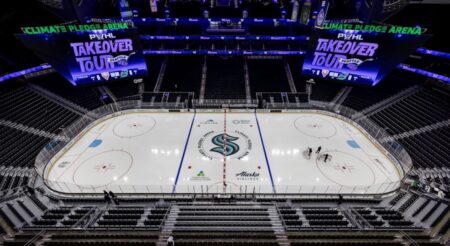The Arizona Coyotes’ deal to utilise Arizona State University’s (ASU) new multi-purpose arena as its temporary home has officially been concluded, with fears being allayed that the NHL ice hockey franchise may have to spend a portion of the opening exchanges of the 2022-23 season on the road before it can move in.
In February, the Coyotes agreed a multi-year deal with ASU to play at its new arena beginning next season, as the team continues efforts to secure a permanent home. The agreement will see the Coyotes play all their home games at the venue from 2022-23 through the 2024-25 NHL season, with an additional option for the 2025-26 season.
ASU chief financial officer, Morgan Olsen, has now confirmed the completion of the agreement, adding that a potential sticking point over the Coyotes’ arrival will be avoided. National Collegiate Athletic Association (NCAA) rules stipulate that the Coyotes cannot use ASU’s team spaces at the new arena, which has meant that the franchise has had to invest $19.7m (£16m/€18.6m) in developing an annex on the northeast corner of the facility.
The construction of a two-story, approximately 15,000-square-foot annex adjacent to the $134m arena will accommodate NHL-quality home and away team dressing rooms, training areas, equipment rooms, nutrition stations, coaches’ work room, team storage and a fitness room.
Olsen told PHNX Sports that construction on this facility is well under way, with excavation complete, horizontal concrete poured and the frame taking shape. However, with completion not expected until December, Olsen added that ASU is “flexible” and will allow the Coyotes to set up temporary team spaces in the community rink next to the new arena so long as they do not exist “for a long period of time.”
Along with financing the annex, the Coyotes have also committed to paying for interior improvements to bring the arena up to NHL standards. While ASU will retain the rights to all parking revenue, naming rights and sponsorship revenue for the arena, Olsen said the Coyotes’ licensing deal will mean it will keep gate receipts and merchandise sales, along with a share of concession revenue and game-day sponsorships.
The ASU agreement will see the Coyotes having to adjust from playing at Gila River Arena, the club’s former home in Glendale which has a capacity for ice hockey of around 17,000, to its temporary venue, which will seat 4,700 fans for NHL games.
The Coyotes played at Gila River Arena since 2003, and since 2016 the team had signed a year-to-year lease with operator AEG Facilities. The team’s lease ran until the end of the 2021-22 season and the need for the Coyotes to secure a new home intensified in August after the City of Glendale broke off talks over a new deal, stating that it wanted to focus on “larger, more impactful events and uses” for the venue.
In September, the Coyotes revealed plans for a $1.7bn development in the city of Tempe, with the wide-ranging project to be anchored by an arena that would seat around 16,000 fans. The complex would also include a 1,500-seat theatre space, offices, an apartment building, a hotel and shops.
Tempe City Council last month asked the Coyotes to put forward clarification on a number of undisclosed issues after viewing impact studies, projections and detailed information related to the project.
Image: Mortenson





